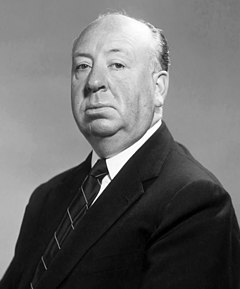Alfred Hitchcock
Sir Alfred Joseph Hitchcock KBE (13 August 1899 – 29 April 1980)[1] was a British movie director who later became an American citizen, but still kept his British citizenship. He mostly made mystery and suspense movies. Despite having a successful career, Hitchcock never won an Academy Award.[2]
Alfred Hitchcock | |
|---|---|
 Hitchcock, c. 1960s | |
| Born | Alfred Joseph Hitchcock 13 August 1899 Leytonstone, Essex, England |
| Died | 29 April 1980 (aged 80) Bel Air, California, U.S. |
| Cause of death | Kidney failure |
| Citizenship |
|
| Education | Salesian College, Battersea |
| Alma mater | St Ignatius' College, London |
| Occupations |
|
| Years active | 1919–1980 |
| Spouse | Alma Reville (m. 1926) |
| Children | Patricia Hitchcock |
| Awards | List of awards and nominations received by Alfred Hitchcock |
Career change
Hitchcock started his career in England, starting with silent movies in the 1920s. In the 1930s, he made some successful movies like The Man Who Knew Too Much (1934), The 39 Steps (1935), and The Lady Vanishes (1938). He then moved to the United States, to work in Hollywood. His first American movie was Rebecca (1940), which won an Academy Award.
Some of his best known movies from the 1940s are Spellbound (1945) and Notorious (1946), which were inspired by psychoanalysis. His first movie in color was the experimental Rope (1948). Strangers on a Train (1951) was based on a novel by Patricia Highsmith. In the 1950s, he made three popular movies with Grace Kelly: Dial M for Murder (1954), Rear Window (1954), and To Catch a Thief (1955). In 1956, he made a new version of The Man Who Knew Too Much, starring James Stewart and Doris Day. He returned to black-and-white, briefly, with The Wrong Man (1957). Then came Vertigo (1958), which some consider his best suspense movie. It was followed by three more successful movies: North by Northwest (1959), Psycho (1960), and The Birds (1963). After that, he only made 5 more movies: Marnie (1964), Torn Curtain (1966), Topaz (1969), Frenzy (1972), and Family Plot (1976). In 1971, he became the very first winner of the BAFTA Academy Fellowship Award. This is an award for lifetime achievement.
In 1945 Hitchcock made a documentary about the Holocaust. It will be shown on British television in 2015.[3]
Hitchcock appeared very quickly in small roles in most of his movies.
He also hosted a TV show, Alfred Hitchcock Presents.
Personal life change
Hithcock was born in Leytonstone, Essex. He was a Roman Catholic.[4] He was married to Alma Reville, who helped write some of his movies. They had a daughter, Patricia. He died in Bel Air, Los Angeles.
Filmmaking style change
Alfred Hitchcock, a famous filmmaker, used several unique elements in his movies. These included the MacGuffin, suspense, cameos, music, blonde leading ladies, close-ups, macabre themes, twist endings, specific locations, and unreliable narrators. These elements contributed to his enduring legacy in the world of cinema.[5]
Films change
Silent films
- Number 13 (1922) (unfinished and lost)
- Always Tell Your Wife (short) (1923) (partially lost)
- The Pleasure Garden (1925)
- The Mountain Eagle (1926) (lost)
- The Lodger: A Story of the London Fog (1927)
- The Ring (1927)
- Downhill (1927)
- The Farmer's Wife (1928)
- Easy Virtue (1928)
- Champagne (1928)
- The Manxman (1929)
Sound films
- Blackmail (1929)
- An Elastic Affair (short) (1930) (lost)
- Juno and the Paycock (1930)
- Murder! (1930)
- Elstree Calling (1930)
- The Skin Game (1931)
- Mary (1931)
- Rich and Strange (1931)
- Number Seventeen (1932)
- Waltzes from Vienna (1934)
- The Man Who Knew Too Much (1934)
- The 39 Steps (1935)
- Secret Agent (1936)
- Sabotage (1936)
- Young and Innocent (1937)
- The Lady Vanishes (1938)
- Jamaica Inn (1939)
- Rebecca (1940)
- Foreign Correspondent (1940)
- Mr. & Mrs. Smith (1941)
- Suspicion (1941)
- Saboteur (1942)
- Shadow of a Doubt (1943)
- Lifeboat (1944)
- Spellbound (1945)
- Notorious (1946)
- The Paradine Case (1947)
- Rope (1948)
- Under Capricorn (1949)
- Stage Fright (1950)
- Strangers on a Train (1951)
- I Confess (1953)
- Dial M for Murder (1954)
- Rear Window (1954)
- To Catch a Thief (1955)
- The Trouble with Harry (1955)
- The Man Who Knew Too Much (1956)
- The Wrong Man (1956)
- Vertigo (1958)
- North by Northwest (1959)
- Psycho (1960)
- The Birds (1963)
- Marnie (1964)
- Torn Curtain (1966)
- Topaz (1969)
- Frenzy (1972)
- Family Plot (1976) (final film)
References change
- ↑ Alfred Hitchcock on IMDb
- ↑ Alfred Hitchcock Anecdotes and Fun Facts at Mystery Net.com
- ↑ Child, Ben (10 January 2014). "Unseen Alfred Hitchcock Holocaust documentary to be released". The Guardian – via www.theguardian.com.
- ↑ "Hitchcock's faith deeper subtext in his 'scary' films". Archived from the original on 2011-11-29. Retrieved 2011-12-27.
- ↑ "10 Signature Elements of Alfred Hitchcock's Filmmaking Style!". Critic Film. 2023-04-20. Retrieved 2023-10-23.